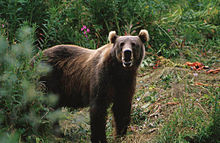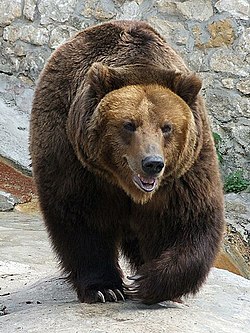熊
Translingual
Han character
熊 (Kangxi radical 86, 火+10, 14 strokes, cangjie input 戈心火 (IPF), four-corner 21331, composition ⿱能灬)
References
- Kangxi Dictionary: page 679, character 10
- Dai Kanwa Jiten: character 19294
- Dae Jaweon: page 1090, character 32
- Hanyu Da Zidian (first edition): volume 3, page 2227, character 5
- Unihan data for U+718A
Chinese
| trad. | 熊 | |
|---|---|---|
| simp. # | 熊 | |

Glyph origin
| Historical forms of the character 熊 | ||
|---|---|---|
| Warring States | Shuowen Jiezi (compiled in Han) | Liushutong (compiled in Ming) |
| Chu slip and silk script | Small seal script | Transcribed ancient scripts |

|

|

|
Transcribed ancient scripts File:ACC-L30032.svg L30032 File:ACC-L30033.svg L30033 File:ACC-L30034.svg L30034 File:ACC-L30035.svg L30035 File:ACC-L30036.svg L30036 File:ACC-L30037.svg L30037 File:ACC-L30038.svg L30038 File:ACC-L30039.svg L30039 File:ACC-L30040.svg L30040 File:ACC-L00946.svg L00946 File:ACC-L00947.svg L00947 File:ACC-L00948.svg L00948 File:ACC-L00949.svg L00949 File:ACC-L00950.svg L00950 | ||
|
References:
Mostly from Richard Sears' Chinese Etymology site (authorisation),
| ||
Phono-semantic compound (形聲/形声, OC *ɢʷlɯm) : phonetic 能 (OC *nɯː, *nɯːs, *nɯːŋ, *nɯːŋʔ) + semantic 火 (“fire”).
This character originally represented an onomatopoetic word (熊熊 (xióngxióng, “(of flame) raging”)). Later its phonetic compound 能 (OC *nɯː, *nɯːs, *nɯːŋ, *nɯːŋʔ), the character for the Old Chinese word "bear", was borrowed for another word. This character thus began to represent the word "bear" instead.
Etymology
From Proto-Sino-Tibetan *d-wam. Cognate with Tibetan དོམ (dom, “bear”), Burmese ဝံ (wam) (in ဝက်ဝံ (wak-wam, “bear”)).
Pronunciation
Lua error in Module:wuu-pron at line 210: Invalid syllable: 3hhion. Wugniu expected, but another romanisation is supplied.
Definitions
- bear (mammal) (Classifier: 頭/头 m; 隻/只)
- (colloquial) to scold
- to oppress, to tyrannise
- mean; malicious; merciless
- loutish; oafish
- (slang) bear; a large, hairy man, especially homosexual one
- Lua error in Module:names at line 633: dot= and nodot= are no longer supported in Template:surname because a trailing period is no longer added by default; if you want it, add it explicitly after the template Xiong (mainland China), Hsiung (Taiwan), Hung (Hong Kong)
Compounds
Lua error in Module:zh/templates at line 32: This template has been deprecated. Please use Template:col3 instead.
Japanese
Kanji
Readings
Compounds
- 牡熊 (osukuma): a male bear
- 雌熊 (mesukuma): a female bear; a she-bear
- 子熊 (kokuma): a bear cub
- 小熊 (kokuma): a species of small bear
- 白熊 (shirokuma): a white bear (polar bear)
- 北極熊 (hokkyokuguma): a polar bear
- 黒熊 (kurokuma): the Asian black bear
- 熊笹 (kumazasa): bamboo grass (Lua error in Module:taxlink at line 68: Parameter "ver" is not used by this template.)
- 熊葛 (kumatsuzura): common vervain (Verbena officinalis)
- 熊手 (kumade): bamboo rake
- 熊襲 (Kumaso): the Kumaso people
Etymology

| Kanji in this term |
|---|
| 熊 |
| くま Grade: 4 |
| kun'yomi |
From (deprecated template usage) [etyl] Old Japanese. Probably cognate with 隈 (kuma, “inside corner; inner bend; hollow or hole in something”), perhaps from the way that bears often live in dens. Probably also cognate with Korean 곰 (gom, “bear; hole”).
Pronunciation
Lua error in Module:ja-pron at line 89: Parameter "yomi" is not used by this template.
Noun
- a bear (large mammal of family Ursidae)
- (slang) a bear, an otter (a hairy man, especially one who is gay)
Usage notes
As with many terms that name organisms, this term is often spelled in katakana, especially in biological contexts (where katakana is customary), as クマ.
Derived terms
- 熊鼠 (kumanezumi): Rattus rattus, the black rat
- 穴熊 (anaguma): Meles meles, the Eurasian badger
References
Korean
Hanja
Vietnamese
Han character
(deprecated template usage) 熊 (hùng)
- This term needs a translation to English. Please help out and add a translation, then remove the text
{{rfdef}}.
- Translingual lemmas
- Translingual symbols
- Han script characters
- Han phono-semantic compounds
- Chinese terms inherited from Proto-Sino-Tibetan
- Chinese terms derived from Proto-Sino-Tibetan
- Chinese lemmas
- Chinese hanzi
- Chinese nouns classified by 頭/头
- Chinese nouns classified by 隻/只
- Chinese colloquialisms
- Chinese slang
- Advanced Mandarin
- zh:Ursids
- Japanese kanji
- Japanese fourth grade kanji
- Japanese kyōiku kanji
- Japanese jōyō kanji
- Japanese kanji with goon reading う
- Japanese kanji with kan'on reading ゆう
- Japanese kanji with kun reading くま
- Japanese kanji with nanori reading かげ
- Japanese terms spelled with 熊 read as くま
- Japanese terms read with kun'yomi
- Japanese terms derived from Old Japanese
- Japanese lemmas
- Japanese nouns
- Japanese terms with multiple readings
- Japanese terms spelled with fourth grade kanji
- Japanese terms with 1 kanji
- Japanese terms spelled with 熊
- Japanese single-kanji terms
- Japanese slang
- Japanese basic words
- ja:Ursids
- Korean lemmas
- Korean hanja
- Vietnamese lemmas
- Vietnamese Han characters



